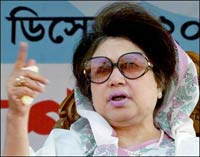Former Bangladesh Prime Minister Khaleda Zia arrests on corruption charges
Former Bangladesh Prime Minister Khaleda Zia was detained Monday in a case involving container terminal contracts, in the second arrest of a former premier in recent months. The interim, military-backed government installed in January has vowed to clean up graft and factional squabbling among a political elite widely viewed as corrupt.

Investigators searched the home of detained Khaleda Zia and confiscated documents and mobile phones in their drive to probe corruption among the Bangladeshi political elite, an official said Tuesday.
Equipped with a search warrant, police and anti-corruption agency officials went through Zia's home in the capital for several hours soon after her arrest, Anti-Corruption Commission official Zahirul Haq said.
"We will analyze the papers," Haq said.
Zia has insisted she is innocent of any corruption allegations.
"This is a conspiracy to tarnish the image of my family and my party. We have done nothing wrong. This case against us must be lifted," Zia told the court Monday before being jailed pending trial.
Her youngest son, Arafat Rahman, also was detained in the case and ordered held for seven days for questioning.
Zia is being held in a makeshift prison near the Parliament building and just a few blocks from where her archrival and another ex-premier, Sheikh Hasina, has been held since July on extortion charges.
Zia is accused of misusing her power while awarding two container terminal contracts to a local company, Global Agro Trade Company, when she was in office in 2003. Arafat Rahman, who is better known by the nickname Coco, is suspected of influencing his mother to approve the deal.
Bangladesh has been ruled since mid-January by an interim government installed by the military after 30 people were killed in political clashes following the end of Zia's term. National elections planned for Jan. 22 were canceled. A state of emergency is in force in the South Asian nation, barring all political gatherings.
The government has vowed to fight corruption, reform electoral rules and clean up the nation's factional and often violent politics before holding the next elections.
Zia and Hasina have dominated Bangladesh's politics since their joint campaign ended years of military rule and restored democracy to their impoverished nation in 1990. The two women head the country's two biggest parties and their supporters have frequently engaged in deadly street clashes.
At least six former ministers from both Hasina's Awami League and the Bangladesh Nationalist Party have already been tried for corruption and misuse of power.
Bangladesh, an impoverished nation of 150 million people, is one of the world's most corrupt countries according to the Berlin-based anti-corruption watchdog Transparency International.
Subscribe to Pravda.Ru Telegram channel, Facebook, RSS!


